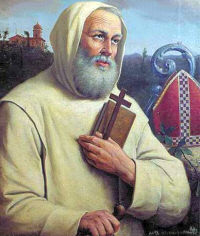 St Martin of Tours (c.316 - 397) was born in the Roman province of Pannonia (approximating to the western half of modern Hungary) in about 316 and was educated at Pavia in Italy. He was baptized, left the army and after spending some time as a hermit on an island off the Ligurian coast, founded a monastery at Ligugé in western France, where he lived a monastic life guided by St Hilary. Later he was ordained priest and became bishop of Tours. In his actions he gave an example of what a good shepherd should be. He founded other monasteries, educated the clergy, and preached the Gospel to the poor. He died in 397.
St Martin of Tours (c.316 - 397) was born in the Roman province of Pannonia (approximating to the western half of modern Hungary) in about 316 and was educated at Pavia in Italy. He was baptized, left the army and after spending some time as a hermit on an island off the Ligurian coast, founded a monastery at Ligugé in western France, where he lived a monastic life guided by St Hilary. Later he was ordained priest and became bishop of Tours. In his actions he gave an example of what a good shepherd should be. He founded other monasteries, educated the clergy, and preached the Gospel to the poor. He died in 397.The famous story about St Martin is that while a soldier in Amiens he gave half of his military cloak to a beggar and later had a dream in which the beggar revealed himself as Christ.
T
































